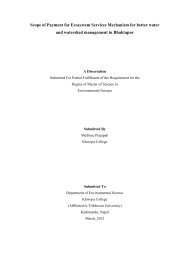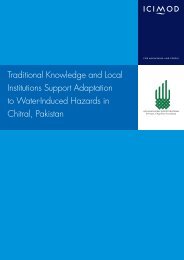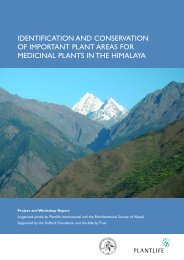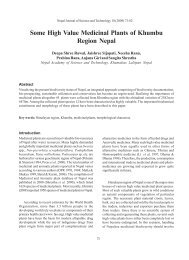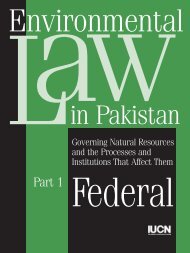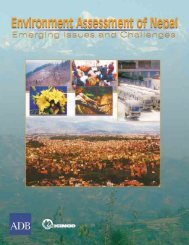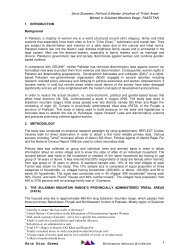Flash Flood Risk Management â A Training of Trainers ... - ReliefWeb
Flash Flood Risk Management â A Training of Trainers ... - ReliefWeb
Flash Flood Risk Management â A Training of Trainers ... - ReliefWeb
You also want an ePaper? Increase the reach of your titles
YUMPU automatically turns print PDFs into web optimized ePapers that Google loves.
Day 8<br />
gathered with each new flood event. Mechanisms must therefore be in place to feed basic planning data and<br />
assessments <strong>of</strong> actual performance back into the strategic planning process. Various types <strong>of</strong> information that<br />
are generated in the monitoring process are required for preparedness as well as to keep improving strategies<br />
for emergency response, and these need to be shared across administrative boundaries.<br />
Raising the awareness <strong>of</strong> property owners and stakeholders on the risks <strong>of</strong> flooding is paramount. When<br />
stakeholders understand the risks to which they are exposed, they are more likely to participate in the<br />
planning process. The flood hazard maps and all <strong>of</strong> the plans, programmes, and strategies that have been<br />
devised form the basic information package that should be shared with all stakeholders as part <strong>of</strong> their<br />
pre-flood preparedness. These, along with the related timing and background information that have been<br />
subjected to public scrutiny, must be made available and accessible to the public at large.<br />
Information about the rights, powers, and obligations <strong>of</strong> the concerned authorities for the provision <strong>of</strong> flood<br />
forecasting, warning, and emergency response should also be shared. The rights <strong>of</strong> access <strong>of</strong> authorities<br />
to relevant information should be made clear, and the availability <strong>of</strong> such information should be ensured<br />
(basin wide). Authorities should be obligated to broadcast flood warnings in the mass media. Unambiguous<br />
assignment <strong>of</strong> responsibilities is also essential for establishment <strong>of</strong> liabilities in the case that warnings are<br />
issued too late, inaccurately, or without just cause.<br />
Enabling stakeholder participation<br />
Stakeholder participation is central to the IFM concept. In order for IFM to deliver maximum benefit to the<br />
largest number <strong>of</strong> people, all stakeholders must be involved in the decision-making process. The level <strong>of</strong><br />
participation <strong>of</strong> the different interested groups will vary depending on their expertise and whether they are<br />
involved nationally or locally, however, regardless <strong>of</strong> the level <strong>of</strong> involvement, without effective participation<br />
from all quarters, IFM cannot succeed.<br />
The realisation that the participation <strong>of</strong> stakeholders in flood management is necessary leads to a number <strong>of</strong><br />
questions, such as:<br />
• Who are the stakeholders?<br />
• What decisions should they be involved in?<br />
• What information should be provided, and how, to achieve effective participation?<br />
• How much consideration should be given to stakeholder views?<br />
• What rights, powers, and obligations should the stakeholders and the decision-making authorities have?<br />
It is important to recognise that the stakeholders referred to above include not only property owners and<br />
inhabitants <strong>of</strong> the area (who are particularly vulnerable to flooding), but also other bodies that have an interest<br />
in the way the decisions affecting flood management are made. If flood management is to be sustainable, it<br />
must accommodate the economic, environmental, and social needs <strong>of</strong> the basin, and stakeholders reflecting<br />
each <strong>of</strong> these aspects must have a role in the way flood management is planned and implemented.<br />
Ensuring rights, powers, and obligations<br />
Institutions and individuals must have the necessary rights and power to implement the legal provisions<br />
related to flash flood management. Legislation works within the framework <strong>of</strong> the constitution <strong>of</strong> a country.<br />
Constitutional rights differ from those arising from the overall statutory framework. The rights <strong>of</strong> institutions and<br />
organisations need to be examined separately from the rights afforded to individuals. Some countries have<br />
promoted decentralisation and transferred powers to formal village groups and associations; in that context<br />
group rights have been significant. With the adoption <strong>of</strong> integrated and participatory approaches to flood<br />
management there is a growing need to develop conditions under which groups can form legally constituted<br />
associations or local self-governance units to exercise their legal rights.<br />
session 17<br />
125



